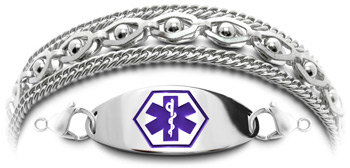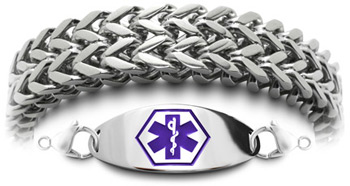How Acidic Skin & Other Chemicals Can Affect Metal in Medical ID Bracelets.
It’s well known that some skin types can cause metals to deteriorate faster than others: Yet the explanation is not easy to pinpoint. We’ve seen that high acid skin in some people can actually pit the metal surfaces making it appear gray and dull. This includes all precious metals. Sometimes it changes the color of rhodium-silver and pewter to copper which unfortunately cannot be cleaned away. We’ve come to attribute this chemical reaction to higher than normal acid levels on the skins’ surface which in turn, can etch or pit almost any metal finish. In extreme cases, even plated or solid gold, silver, rhodium and platinum can be etched and tarnished from higher than normal acid skin. Read more at My Health And Living.

“I can strip chrome off a watch..." It's uncommon, but not unheard of that some people feel as though they are alone with this issue. The reality is that because we encounter hundreds of patients in need of medical ID bracelets every day—we can assure you that you're not alone. Here are some comments from others who struggle with finding the right metals and accessories to fit their skin type: “I can strip chrome off a watch after a few months and have destroyed a few pairs of sunglasses by causing them to peel where they contact my face”—“I used to eat through the Timex watches my parents bought me in months until Dad gave me one of his old stainless steel watches.”—Courtesy of: http://www.basenotes.net/threads/168446-acidic-skin
Acid wards off infections: Thanks to the University of California San Francisco, we can partially explain why even normal skin tends to be acidic from a medical perspective. They tell us, “for decades scientists have known that the outer layers of the skin are about as acidic as a bowl of crushed tomatoes. This acidity was believed to help ward off infections by preventing the growth of bacteria” and helps “to maintain the skin’s strength and integrity” and “that the acid is produced when enzymes break down fat-like molecules in skin cells into smaller acid-tipped fat molecules called fatty acids”. Courtesy of University of California San Francisco (SFVAMC researchers article).
When acid is high: This seems to happen mostly in people with severely compromised immune systems, it could be the body’s way of protecting itself by strengthening its first line of defense: the skin. While helpful to ward off more illness, it certainly has little regard for fashion. For people that are in this category, it is advisable to stay with stainless steel medical bracelets.
If not acid, then chemicals: We’ve known for some time that chlorine and sea salt have a corrosive effect on precious gold, silver, rhodium and platinum bracelets. That is why we always advise our customers to wash off gold and rhodium plated bracelets with fresh water after swimming in chlorinated pools, or the naturally salty ocean waters.
Sunscreens for your skin, not your ID bracelets: What’s not as obvious is that some lotions, perfumes and sun screens have chemicals in them that will etch and pit precious metals. For this reason, we tell our customers to not apply any lotions or perfumes while wearing our bracelets. Only apply lotions and sunscreens when your bracelet is not on your wrist. Then put the bracelet back on only after your skin has dried. If you are someone who wears lotion daily, it is advisable to rinse off precious metal bracelets with fresh water and clean it with mild and diluted dishwashing soap on a weekly basis.
Your best solution may be to wear designer stainless steel or all-beaded fashion bracelets: Medical ID Fashions has learned a lot from our customers over the years about what works and what does not. That’s why we’ve scoured the world over for more attractive designer stainless steel chains and for non-metal beads in tough hand-blown-glass and in precious stones and natural crystals. Since not everyone is the same, we try our best to accommodate your real-world issues.
